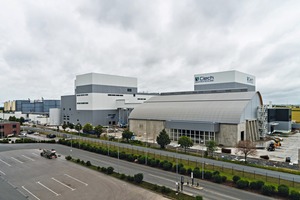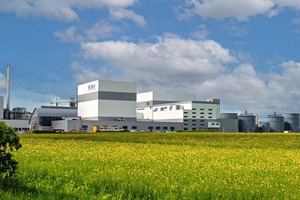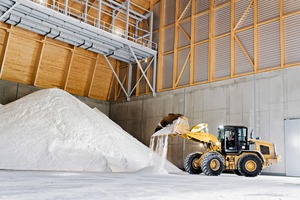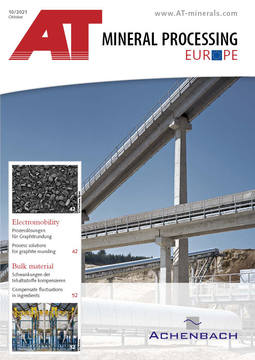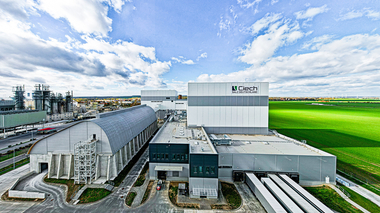New CIECH salt boiling plant in Stassfurt/Germany
CIECH is an international chemical group with a strong position in global markets. In its portfolio, CIECH has, among others, sodium carbonate (sodium bicarbonate) and sodium bicarbonate, evaporated salt sodium silicates, as well as crop protection agents and polyurethane foams. CIECH has production facilities in Poland, Germany and Romania and employs over 3000 people across the EU. The Stassfurt site in Germany currently employs about 400 people, and the start-up of the salt plant adds another 140 employees.
The salt produced here is the starting material for a wide range of products used in food processing, in the pharmaceutical industry, in animal feed products, in water treatment and softening, as a cleaning agent in dishwashers, and as industrial salt in various industrial processes. At the Stassfurt site, CIECH already operates the soda plant for the production of sodium carbonate and sodium bicarbonate (including pharmaceutical-grade sodium bicarbonate), using efficient combined heat and power (CHP) technology. CIECH uses its own limestone deposits and brine to produce sodium carbonate and salt. The new salt production plant complements the existing facilities and exploits the advantages of the German location and the availability of its own raw material sources (brine). The new salt plant in Stassfurt has a very attractive location, enabling expansion into Western European markets.
Construction progress of the salt boiling plant and Corona-related delays
In spring 2020, construction work had to be interrupted due to the Corona pandemic and the associated restrictions. The presence of many international experts on site was indispensable. Thus, specialists from a multitude of countries worked together on this construction project - components for the factory were ordered from Italy, Switzerland, Poland, Croatia and Germany, among others. Especially during the intensified construction phase of the past twelve months, the restrictions caused delays in the supply chains and passenger traffic. In addition, there were longer waiting periods in the issuing of permits and in the cooperation with local and regional offices during the pandemic. The CIECH Group is proud that it was able to successfully overcome these challenges despite the Corona-related restrictions.
Modern technology relays on sustainability
The salt boiling plant in Stassfurt is one of the most modern plants of its kind in Europe. Evaporated salt is produced on the basis of MVR technology (water evaporation through the supply of pressurised steam). This technology is particularly efficient and environmentally friendly. The production process is powered by electricity from a new, particularly efficient, gas-fired combined heat and power plant. The heat generated in parallel provides the energy for efficient heat management in the plant. The combined heat and power plant achieves efficiencies of over 90 % and is certified according to the German Energy Saving Ordinance (ENEV). In addition, the salt boiling plant was equipped with an optimal system for the disposal of production waste, which is discharged into an underground storage facility. At times, more than 1000 people worked on the site. In normal operation, about 140 employees will find work in the new plant.
In December 2020, a crane with a lifting capacity of 750 t defined the exterior of the construction site in order to set up the evaporators and dryers, i.e. the brine drying plants, which together form the heart of the Stassfurt salt boiling plant. Miroslaw Skoworn, the CIECH SA Management Board member responsible for the investment, says: “Behind us lie very intensive twelve months of hard work by our CIECH team in Germany and Poland. Thanks to the commitment of our employees in both countries, the very good organisation of the entire process, the great cooperation with suppliers and contractors under extremely demanding conditions, we are ready to start the investment.”
In a press conference on 13 July 2021, CIECH announced plans to start production of pharmaceutical salt in Q4. With the new salt plant, CIECH creates about 140 new jobs. This will increase the total workforce of CIECH in Stassfurt to more than 500 jobs. Own brine deposits, own energy supply and the particularly efficient and and environmentally friendly MVR technology make the plant for the production of evaporated salt one of the most modern and and environmentally friendly in Europe. Only recently the first batch of wet salt and the first salt tablets were produced here. Next, CIECH is planning to start the production of food salt and later pharmaceutical salt. Salt tablets form the basic element in the range of products offered by the plant in Germany and account for a high proportion of the annual production capacity of 450 000 t of evaporated salt per year. After reaching this target value, the CIECH Group will be one of the leading European producers of evaporated salt and at the same time the largest supplier of salt tablets in Europe.
In addition, it was reported that the first products produced in Stassfurt have already been delivered to customers. The salt products are mainly supplied to Europe, pharmaceutical salt is to be exported worldwide. The CIECH Group hits the bull’s eye with the new salt plant. Experts expect that the global market for industrial salts will increase significantly. In 2019 this was estimated at € 13.29 billion and is expected to reach a significantly higher value of € 20.4 billion by 2027*. The salt produced by CIECH is used in many end products, e.g. in medicines, cosmetics and processed foods. CIECH particularly serves the increasing demand for industrial salts with the salt tablets produced in Stassfurt. Also the use of sodium chloride in the manufacture of many products in the pharmaceutical industry is growing. “Thanks to our high-quality brine deposits and the two-stage purification process we are in a position to meet the requirements for the production of pharmaceutical salt and to serve the market,” says Miroslaw Skowron and adds: “Our plan is to get everything in place for pharmaceutical salt production in the fourth quarter.“↓
MVR technology
Environmentally friendly and efficient technology makes CIECH’s new salt plant in Stassfurt one of the most modern of its kind. Salt production from brine is based on the principle of mechanical vapor recompression. Put simply, in MVR (mechanical vapor recompression) technology, superheated steam under high pressure brings the brine to boiling point. The boiling of the water from the solution creates supersaturation of the brine, which leads to crystallization of salt – the evaporated salt is formed.
MVR technology is particularly environmentally friendly because the steam is washed again, fed to compressors, where it is compressed and reheated and consequently can be used again as superheated steam to evaporate the brine. Thanks to this process, CIECH requires fifteen times less heating energy than before. The boiling condensate resulting from the MVR process is used to preheat the brine to almost operating temperature. Due to this intensive preheating and the compression of the steam, in most cases the additional steam consumption is almost zero.

